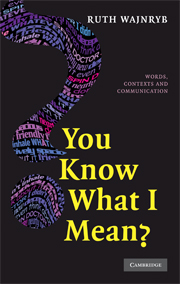Summary
All the sections in this chapter share an abiding theme. In various ways each engages with language associated with the political. In the broad sense, this means any domain of life where power inequities exist (which, let's face it, is everywhere). In the narrow sense, ‘political’ means the arena in which politics happens. It is not surprising that language features prominently here because perhaps no other domain of public life requires language to work so hard. Who else (other than perhaps royalty and celebrities) employs speechwriters, minders, spin doctors and press officers? So much of public life is shaped by perception which itself is mediated and therefore shaped by reporting agencies, like the media. In a democratic society, elections are run on the fuel of public perception; wars are allegedly fought for reasons that are deemed acceptable to the electorate; policy is debated and sold to the nation for reasons that are acceptable in the public domain. People in power want to stay in power and they too use language to serve their vested interests, as do those who seek to wrest power from incumbents. In all such cases, constructing this acceptability is largely a linguistic matter.
Where the truth lies
Truth is the most fragile of concepts. Nowadays, you can say almost anything. A school up the road with a pretty dismal record and reputation recently had a nice coat of paint. A new sign's been erected proclaiming the new school name and its new slogan/motto/logo.
- Type
- Chapter
- Information
- You Know what I Mean?Words, Contexts and Communication, pp. 68 - 87Publisher: Cambridge University PressPrint publication year: 2008



